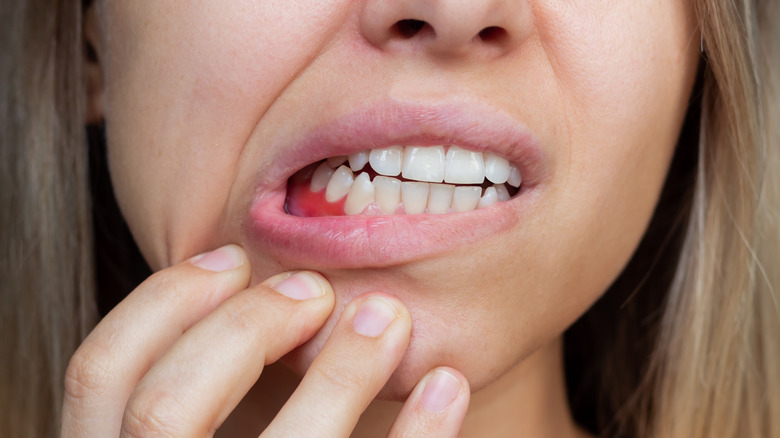Is Gum Disease Contagious?
There are plenty of diseases that we all know are contagious, like COVID-19 and the common cold. But one thing we don't typically think of as transmissible is gum disease. Can oral bacteria actually be contagious?
Gum disease, also called periodontitis, starts with gingivitis (via WebMD). If you have poor oral health and don't brush and floss properly or consistently, bacteria can build up around the teeth, causing plaque to form. This can harden into tartar along the gum line and has to be removed at the dentist. The buildup causes decay and makes the gums inflamed and irritated, which leads to gingivitis.
When gingivitis goes untreated, the plaque spreads below the gum line and the gums begin to pull away from the teeth, leaving open pockets that can collect debris and become infected (per WebMD). As the disease becomes more advanced and bacteria in the plaque goes unchecked, the bones that hold the teeth in place continue to break down, which can lead to tooth loss. In fact, gum disease is the leading cause of losing a tooth as an adult. It's preventable and treatable, but the bacteria may also be spread from person to person.
How bacteria in plaque can be transmitted
With gum disease, the gums can bleed and become swollen, red, and tender, caused by a bacterial infection from plaque buildup (via Healthline). The bacteria can be spread through saliva, like from kissing or sharing a cup. However, just because you kiss someone with gingivitis doesn't mean you'll automatically develop it, too. Your own oral health is important — the poorer your oral health, the more susceptible you are to the exchange of bacteria and developing gum disease.
Babies may be more susceptible, too, due to their developing immune systems. A 2008 study in the Journal of Periodontology found that, possibly due to shared bacteria, children are at risk of developing gum disease if their parents have it.
The good news is that gum disease is preventable and treatable (via Healthline). Practicing good oral hygiene is the best method of prevention: brush your teeth twice a day, floss your teeth at least once a day, and see a dentist for regular cleanings. If you notice symptoms of gum disease, see your dentist for a professional cleaning right away.

